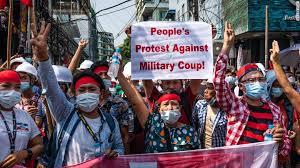Myanmar’s Coup
February 13, 2021
In Myanmar, the military recently launched a coup, or an unexpected overthrow of the government, which turned the country to martial law. In the coup, the country’s elected leader, Aung San Suu Kyi, was detained and stripped of her power, among other former elected officials. In order to keep Kyi detained, she was charged with violating an import law. Thousands of citizens in Myanmar came together in Yangon, the largest city in the country, to protest the new government.
In the November elections, the National League for Democracy, the country’s leading party, won 83 percent of the body’s available seats. The new Parliament was supposed to validate the election results and approve the next government, but the military surrounded the houses of Parliament with soldiers after arguing that the election results were fraudulent in the country’s Supreme Court.
According to recent reports, the military quickly took control of the country’s infrastructure, suspending most television broadcasts and canceling all domestic and international flights. Telephone and internet access were also suspended in major cities, and both the stock market and commercial banks were closed. Residents in Yangon ran to supermarkets to stock up on food and other necessary supplies.
Leaders around the world speedily condemned the military’s action, insisting that they should free Ms. Aung San Suu Kyi and the other detained government leaders immediately. António Guterres, the United Nations secretary-general, said the recent events in Myanmar “represent a serious blow to democratic reforms in Myanmar,” and Boris Johnson, the Prime Minister of the United Kingdom, tweeted, “[the] vote of the people must be respected and civilian leaders released.” However, no nations have taken any real action to restore the elected government.
Western governments sanctioned Myanmar when they previously had a military rule, but the sanctions were eased in the elections in 2010 and 2015 because the country was taking steps toward democracy. On Thursday, the United States sanctioned Min Aung Hlaing (military leader of Myanmar) and Soe Win (his deputy), as well as four members of the State Administration Council. According to the White House, “The United States opposes any attempt to alter the outcome of recent elections or impede Myanmar’s democratic transition, and will take action against those responsible if these steps are not reversed.” President Biden signed an executive order allowing the Treasury Department to economically target the families of those sanctioned in hopes of preventing the generals from accessing more than $1 billion in Myanmar government funds held in the US.


